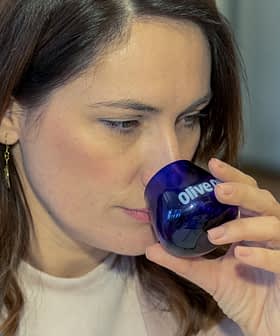A first of its kind consumer study from the Olive Center at the University of California, Davis, finds a disconnect between consumer preference and expert ratings for olive oil labeled as extra virgin. It looks like Northern Californian consumers prefer rancid olive oil to the bitter and pungent olive oil favored by expert olive oil tasters. Findings call into focus the continued need for consumer education to keep California olive oil in position for growth.
The study of 110 Northern California olive oil consumers was conducted by UC Davis sensory scientists Claudia Delgado and Jean-Xavier Guinard. Participants rated 22 commercial olive oils labeled as extra virgin based on preferences. Half of the oils were imported and half were from California. “How do consumer hedonic ratings for extra virgin olive oil relate to the quality ratings by experts and descriptive analysis ratings?” appears in the March, 2011 Food Quality and Preference journal.
See Also:UC Davis Survey: Consumer Attitudes on Olive Oil
Seventy four percent of consumers disliked the oils identified as high-quality by expert tasters. High-quality oils tend to be bitter and pungent, negative drivers of liking for consumers. The authors of the study indicate this is a natural reaction for new consumers because these qualities are acquired tastes, such as in coffee or specialty beer. When used in cooking and paired with food, bitterness and pungency may be more palatable, especially with the knowledge that they are caused by healthy antioxidants in the oil.
Consumers preferred oils with fruity attributes identified as nutty, ripe fruit, green tea, butter, green fruit and grassy, which, along with bitterness and pungency, are positive sensory attributes of olive oil as identified by the International Olive Council (IOC) standards. (By IOC standards, extra virgin olive oil must have all three of these attributes and no defects.) But, 44 percent of the consumers also liked sensory defects like rancidity, fustiness, mustiness and winey flavor. The authors indicate this may be due to the large amount of defective olive oil labeled as extra virgin available to consumers.
The study results imply that quality ratings by experts are not a good predictor of consumers’ hedonic scores, an indication, says Dan Flynn, Director of the UC Davis Olive Center, “that consumers have much to learn about the various flavor profiles and that a bitter profile is not necessarily bad.” Flynn sees this as an opportunity for education, “for producers to let people know here’s what a good quality oil tastes like and there are lots of different taste profiles.”
Many different things contribute to the education of the consumer. “One is the Olive Oil Times,” says Flynn, which he credits for getting information out there. Another is the industry who is out promoting the oil, and next, from a research standpoint, UC Davis is doing its part. “All these discussions,” explains Flynn, “and the availability of quality oils are contributing to this slowly growing knowledge that the consumer has.”
This new study recognizes the importance of consumers, both in educating them and recognizing the driving role of consumer liking and preferences to the olive oil industry. The authors predict “as consumers learn about the many nutritional benefits and sensory qualities of extra-virgin olive oil, the California industry will be poised for exponential growth.”
Research Brief: UC Davis Olive Center examines consumer olive oil preferences (PDF)



